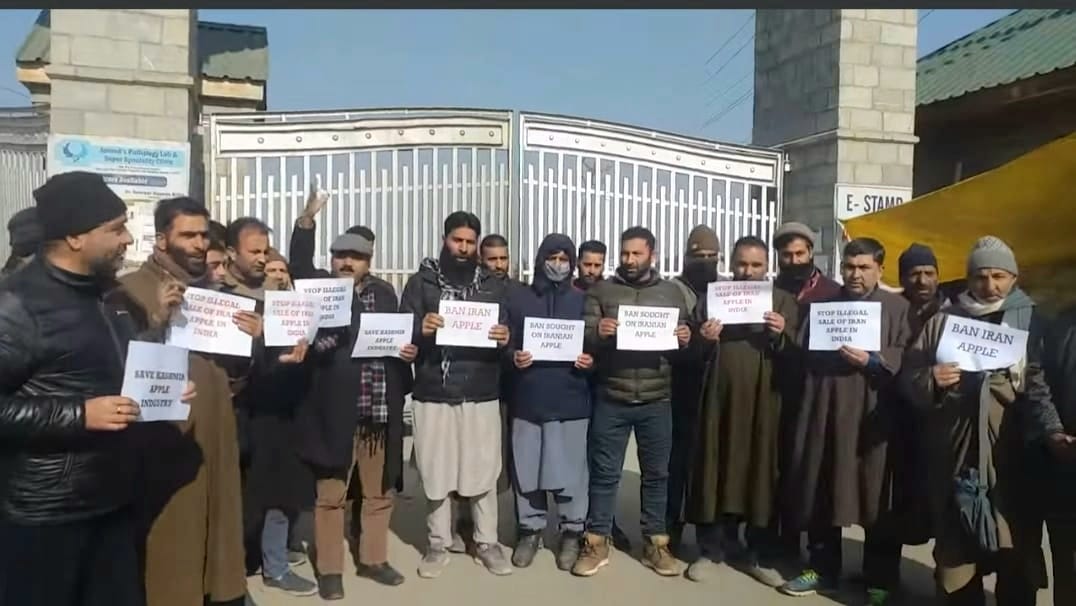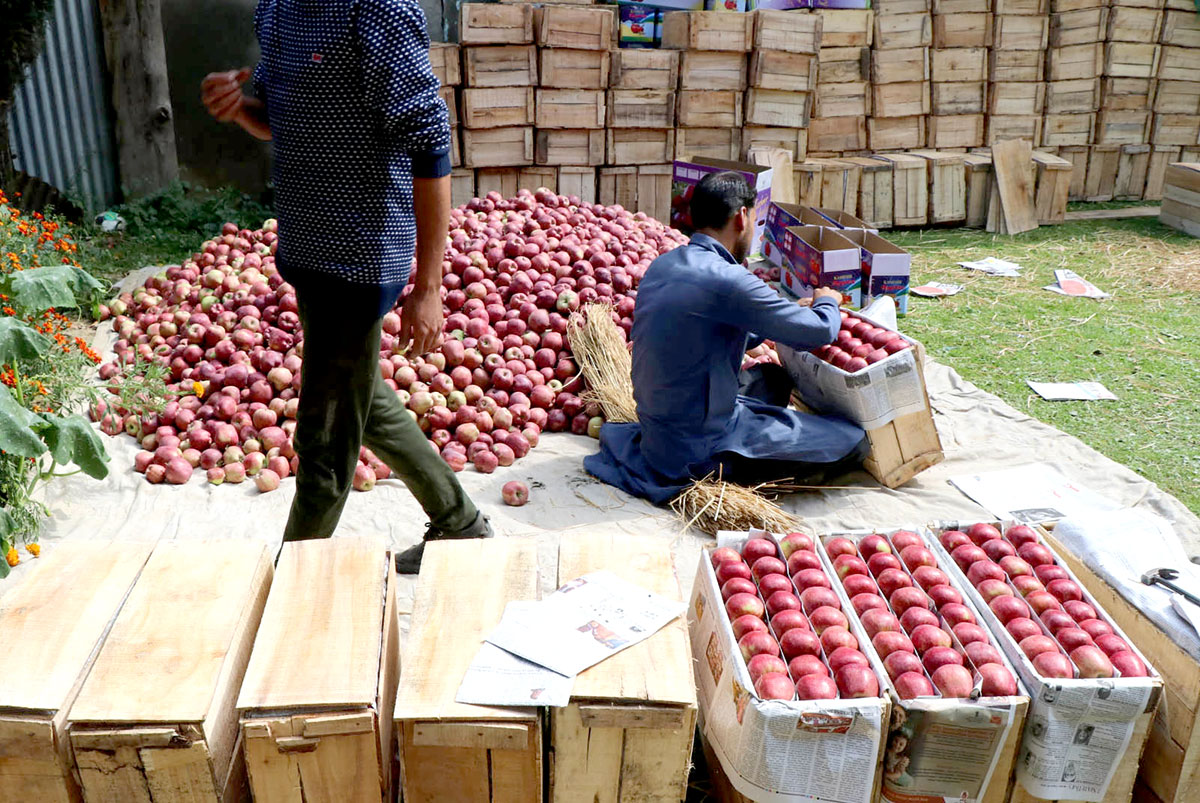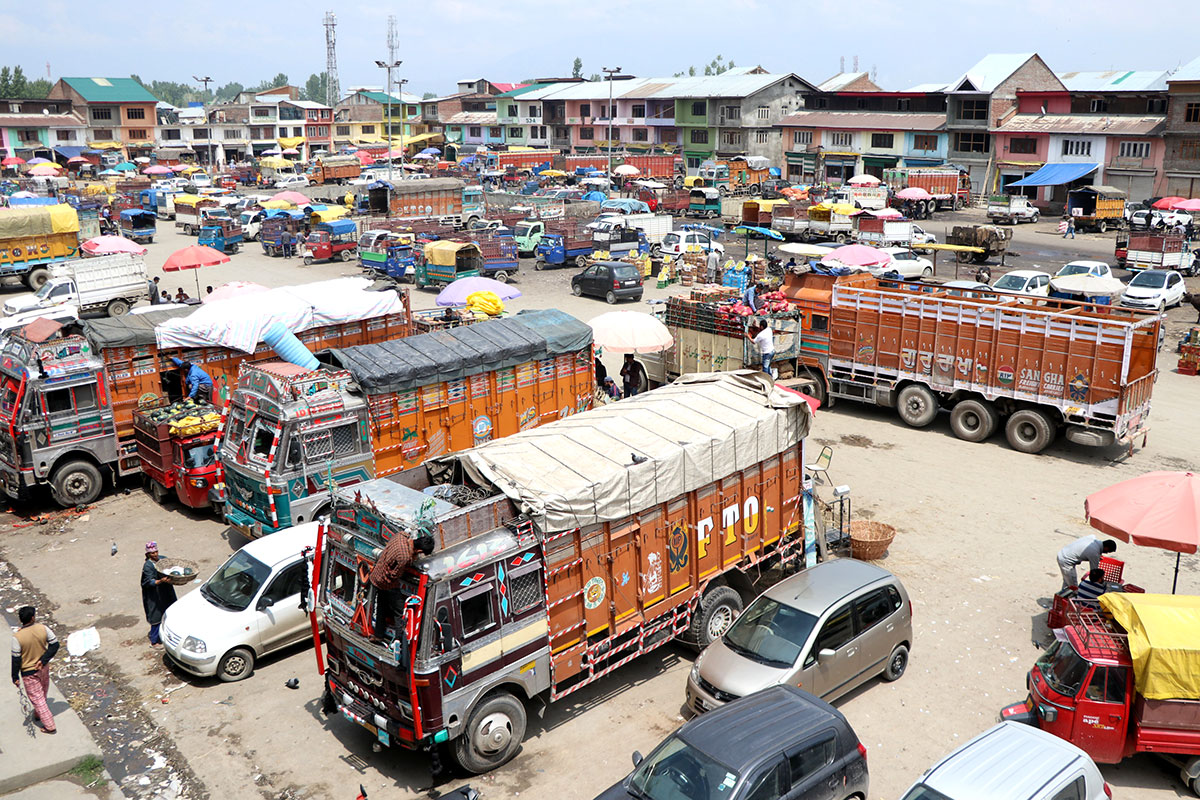Protests by traders suggesting the Iranian apple imports should be banned to protect the domestic produce may not be a good idea to help Kashmir’s apple cart have a smooth run, reports Masood Hussain

Last week was dominated by the news suggesting that the Kashmir apple cart is in a mess. Details suggest that “illegal” imports of Iranian apple are selling at throwaway costs that have impacted the Kashmir produce. Reports suggest that a lot of apple harvest is either waiting for price stability or has been sold at slightly more than half of it.
There were protests in Sopore fruit mandi for many days on daily basis with the traders seeking a ban on “illegal” imports. Most of them said they delayed the departure of the fruit in order to escape from the possible glut and rate crash. Now, however, they are fetching almost half of the rates because the Iranian imports are selling “too cheap”.
These reports have led even the political class to get into the ring with demands that the imports must stop to help the Kashmir produce retain its status in India’s vast market. Worth mentioning here, a similar situation had arisen in late 2020 as well when the Iranian imports started getting into the Indian market.
Insiders see the issue as an “area of concern” but insist that the element of exaggeration is creating the debate. “We had better crop this year, maybe 25 per cent more than that of last year,” one senior officer said. “So far we have already sold almost 17 lakh metric tonnes. Right now, we have 1.87 metric tonnes in our cold atmosphere storage (CAS) chain and maybe another one lakh tons retained by growers that is now going in piecemeal.” Official estimates put the 2021 harvest that would eventually go to the market at around 21.5 lakh metric tonnes that makes it a bumper year.
Another officer who has investigated the issue at his personal level said most of the Iranian imports are high-density varieties and the price variation is not “so huge”. The officer said that it will have a minimal impact on the Kashmir crop. “We will be marketing the stored fruit in May and June and at that time, there is not much of the competition,” the officer said.

Apple Imports
Kashmir apple producers need to understand that India is a huge consumer market that requires fruit supply around the year. For the year 2021-22, apple consumption is estimated to be around 26 lakh metric tonnes. Permitting apple imports almost two decades back, India is Asia’s major apple importer, currently accessing apple from 29 destinations across the globe. Since 2018, it removed port-specific barriers on apple imports that opened all entry points for apple on the land border, sea and airports. It was for the first time in 2017 when the overall imports had reached 3.30 lakh ton level, only to fall to sub-3 lakh ton, a year later.
The Covid19 situation had its own impact on imports. Seemingly, however, the apple imports between April and October 2021 have been double than that but is yet to cross three lakh metric tonnes. Trader insiders anticipate the imports reaching 4.5 lakh tones by the end of March 2022.
There are two major shifts in India’s apple imports. Firstly, India’s trade issues with US and China, the two major apple exports to India. India has banned Chinese apple imports in 2017. With the US, its second major overseas apple supplier, it had two issues. Delhi wanted every fresh fruit supply to have a ‘non-GM origin cum GM-free certificate’. It took US’s Red Delicious apple sellers a lot of time to convince their government to issue such certificates and while doing this their share in India’s apple market fell from the second (supplied 107000 cartons in 2019) to twelfth position (381 thousand) in 2021.
Even though the US apple regained its access to its key market, its apple continues to attract a “punitive” 70 per cent import duty which is 20 per cent more than levied on all other apple imports in India.
The second major trend that is now getting exhibited is that apple imports from three nations have improved in last year, till October 2021. Imports from Afghanistan have witnessed a jump of 161 per cent, Iran apples have appreciated by 573 per cent to reach 30372 metric tonnes and, interestingly, Turkey imports have seen a jump of 303 per cent.
Anticipated to import almost 4.5 lakh metric tonnes by the end of March 2022, it is Iran that dominates the scene. Iran in the last fiscal had a 19 per cent market share in India’s apple import basket, followed by Turkey’s 16 per cent, Chile’s 12 per cent, Italy’s 11 per cent and Afghanistan’s seven per cent.
How far this appreciation in apple volume imports are linked to diplomacy is not known. One thing, however, is very clear that Iran continues to be India’s second major oil supplier and Tehran and Delhi have been old good friends. Turkey, at the same time, has been a supplier for a very long time and off late the two countries are not unwilling to mend fences. Iran is under sanctions and it must be obliged to any country that trades with her. The possibility of Afghanistan using the Pakistan corridor for any kind of exports to India seems far-fetched after the Taliban takeover.

Trade Concerns
“We are not in a position to dictate the import-export of a country that is linked to foreign policy,” a Kashmiri trade who has a sizable investment in the horticulture sector said on phone. “The problem is that these imports through sea are being allowed at undervalued bills that is eventually creating a problem in the market.”
Official sources said the government has taken note of the issue and it has already written to the central government requesting the concerns mounting in Kashmir should be addressed at the earliest.
“We have suggested to the government that they must assess the imported apple at a minimum cost regardless of the bills submitted,” the trader said. “We have to sell our fruit so others will also do, but we need basic protection, not a ban, which is otherwise impossible.”
Export Scene
With Kashmir dominating the key status in apple production, India is the world’s third major apple producer. However, the exports are quite dismal. There are only five countries consuming some of the apple shipments – mostly from Kashmir.
Of the overall apple exports of around 30 thousand metric tonnes, Bangladesh is consuming half of it and the half is shared between Nepal and UAE. Most of it originates from Kashmir.
The Pest Tension
While the traders are protesting against the marketing issues, the real tension that is germinating is pushed to the backburner. It is the detection of two peculiar pests in the Kiwi fruit that is being imported from Iran. It was on December 7, 2021, when the Agriculture Ministry’s National Plant Protection Organisation (NPPO), communicated to Tehran about the presence of two quarantine pests, Aspidiotus Nerd and Aonidella Aurantii, in certain kiwi shipments.
These imports are also cheap like the Iranian apple but it has the potential of creating a serious crisis for the domestic apple species. The Government of India has already written to the Tehran government that its Kiwi fruit may no more be welcome in India. This will help the northeast quickly as is emerging as India’s new Kiwi fruit basket.
The pest has the potential of wreaking havoc on Kashmir’s apple orchards especially at a time when the hyper-sensitive high-density varieties are replacing the old ones. It was on basis of the reports that local trade involved the SKUAST-K experts. The presence of such pests in Ladakh apricot had led to banning the movement of any fresh fruit or vegetable from Ladakh to Kashmir and the ban is now more than three decades old.
The latest reports appearing in the media suggest that the SKUAST-K has not detected the pest infecting the Kashmir crop so far. They, however, have suggested caution.
“The reported pests, named Aspidiotus Nerd, and Aonidella Aurantii, are a threat to the fruit industry of Kashmir, especially apples if they [the insects] start multiplying,” an official report by SKUAST-K said. “Under these circumstances, caution needs to be taken for such infected imports as they will create problems in Kashmir and endanger the fruit industry, which is the backbone of Jammu and Kashmir.”
Right now, the pest is more important than what happens on the ports in India.















